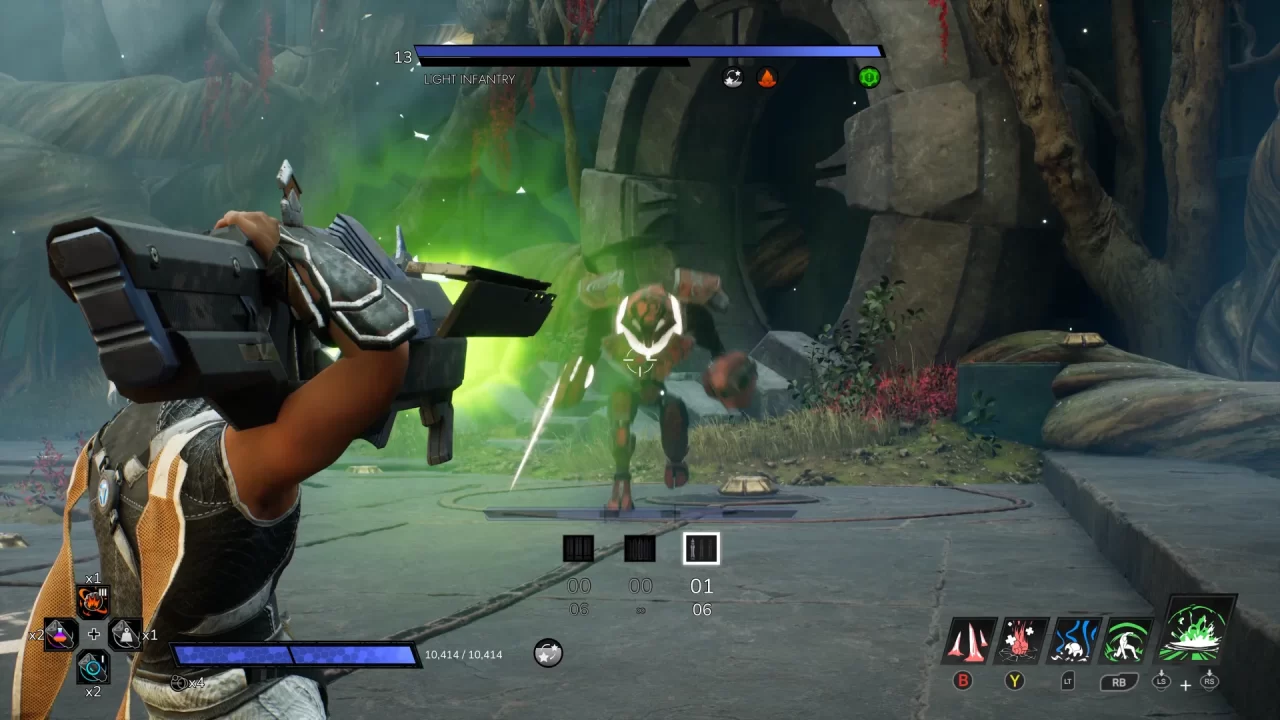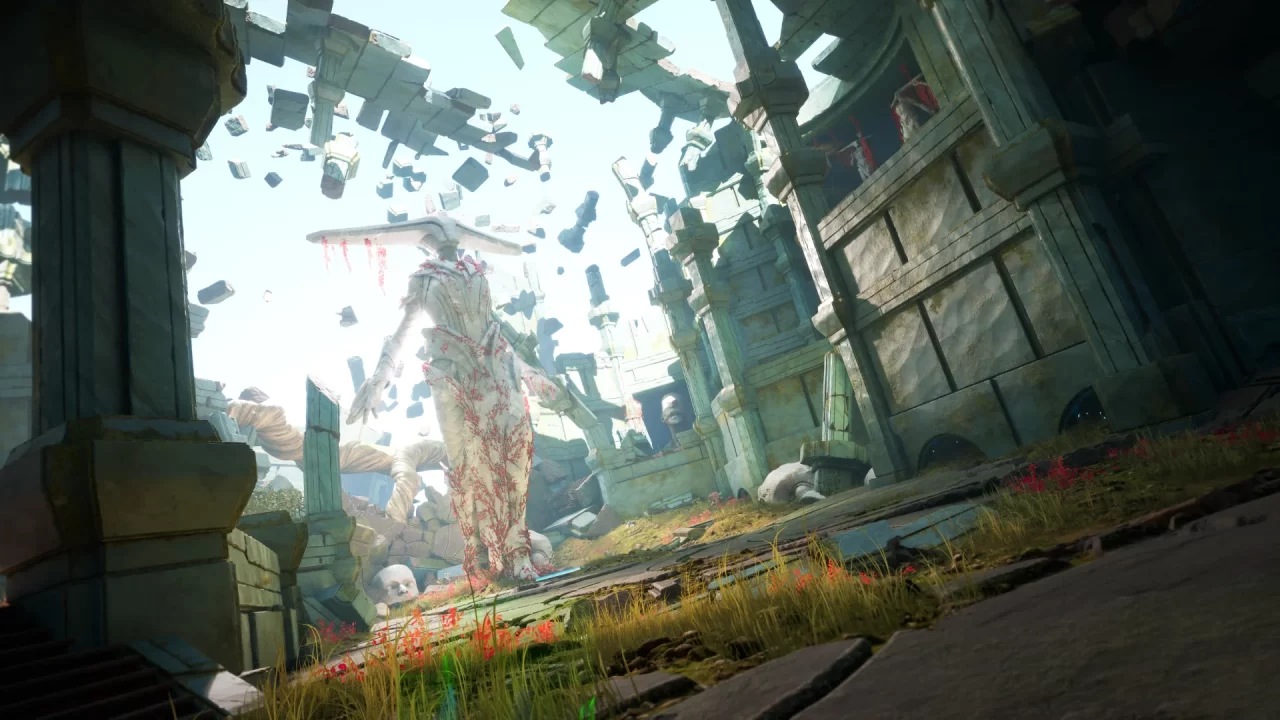Empyreal (em-ˈpir-ē-əl) – adj. 1: of or relating to the empyrean, celestial 2: sublime
I admit I wasn’t aware that empyreal was a word, let alone what it meant, so I thought it a good idea to know what I’m talking about when it comes to Empyreal. Silent Games features a few former Ubisoft crew, and it’s always interesting to see how creators do when they break out on their own after having made a reputation for themselves at a larger company. So, here’s Empyreal, an action RPG with a sci-fi theme, which in many ways feels Ubisoft-ish and in others like it’s trying to be anti-Ubisoft.
Empyreal comes down to you versus the Ziggurat, a massive structure on some planet in some galaxy. The Ziggurat seems to be even bigger on the inside (doctor who?) and there’s some mystery about what’s at its core. You’re a mercenary hired by The Company, whose expedition is failing miserably by virtue of the dangers inside the Ziggurat wiping out their forces. Your job, simply, is to explore it.
There is danger, but you’re up to the task. As an action RPG, Empyreal feels somewhat like a more self-contained Destiny, but also an attempt at an evolution of Souls-likes. In un-Ubisoft-like fashion, however, there’s not much in the way of open exploration. The travel system is convoluted, and despite attempting to convey a huge scale, everything still feels smaller than it should. There are nooks and hidden areas to discover within each area, but the world is never fully connected to where you can explore it seamlessly. Each area functions like a level from an old-school platformer: You fight through a slew of smaller, but by no means easy, enemies before taking on a boss at the end. There’s some randomness in the enemies you encounter and loot to grab, but otherwise, there’s a small number of layouts for these areas, and you eventually get to know them too well after repeatedly seeing the same places.
Empyreal focuses mainly on combat and loot, finding better loot so you can combat better and find more and better loot. Thankfully, these are some deep systems that require you to intimately learn their ins and outs. There are three types of weapons, which doesn’t seem like a lot, but their differences are on par with Monster Hunter. You start with the glaive, though you’ll quickly find a gun and a mace-shield combo to let you get to know those too. Once I found a mace and shield, I was interested to see how it would handle, and it was an unexpectedly harsh learning curve. I had assumed, it’s the same combat system, it surely can’t be that different. But this was like the difference between learning to ride a bike and learning to drive a car. Whereas the glaive is more of an agility-based weapon with your strategy tending to be striking and then quickly dodging out of harm’s way, the mace-shield is more like controlling a tank, which doesn’t even have a dodge move but instead relies on blocking and parrying for defense. Much of my enjoyment in Empyreal came through the process of learning each weapon and the satisfaction of feeling like I’d mastered it.
The loot system is similarly deep. Beyond the simple joy of collecting more and better stuff, it takes off when you get into modding, which allows you to fine-tune each piece of equipment. On the other hand, grinding for loot can get tiring. As your success in explorations depends as much on your loadout as on how well you fight, those who enjoy micromanaging should find plenty to like about Empyreal.
The things you fight also have depth. Though all the enemies are automatons and mostly have similar appearances, there’s a vast variety in how they behave. Some are quicker and try to overwhelm you with flurries of attacks, while others are slow and tanky but pack a wallop. The bosses in particular force you to take vastly different approaches and have novel ways to frustrate your typical strategies. Some like to summon lots of support to keep you busy, and others evilly convert your attacks into shielding. While they look similar, some of their mannerisms amusingly evoke RPG character archetypes. Each boss has a short, mimed-out scene (before they proceed to pummel you) that, though wordless, gives them a little personality. For instance, one does a figure skating routine on the water, while another has an army of bots kneeling before them as if they’re a general. These sequences are great because, unfortunately, there’s little buildup for the bosses in the story.
It’s obvious that Empyreal’s gameplay was the development team’s primary focus, as the story is quite a mess. While the short opening movie sets up the beginning of an epic quest, there’s not much else happening once that’s finished. The story mainly revolves around your relationship with other characters in camp, but you’ll only have a few interactions with each throughout the entire game. They do each petition you to undertake sidequests (which have their own problems), but that’s essentially the extent of those interactions beyond occasional fun, inspired moments that pop up unexpectedly. Overall, the rest of the crew is strangely in good humor considering their dire situation.
The narrative starts to picks up more at the end as if it’s setting up an entirely new story, but it’s so far out there that it makes the whole experience incomprehensible. There is an undertone of making a connection between the extraterrestrial and the divine, which is oddly intriguing but could have been expounded upon more throughout the game. The developers may have been attempting FromSoftware-style environmental storytelling with the different biomes within the Ziggurat and some evocative scenes, but nothing grabbed my attention more than in passing.
Though combat and equipment management are great, a few persistent issues cause headaches. Returning to the Ubisoft connection with Silent Games, it’s weird how Empyreal feels similar to typical Ubisoft games while also taking an opposite approach to many of the long-bemoaned common complaints about those games. You have a sidequest list, and while its brevity is refreshing, there’s no way to be intentional in trying to find the things characters want to the point that you may or may not accidentally stumble upon them throughout your travels. Empyreal has trouble providing guidance in general. When the game introduces a new element, it’s often mentioned in passing by characters and sometimes doesn’t make it into the tutorial list. If you’re tired of handholding in video games, this is the opposite problem, where there aren’t clear markers to even determine the right general direction.
There’s an overall thread of that Ubisoft jankiness throughout Empyreal, from combat to simply navigating the hub. Inside the Ziggurat, the game is refreshingly hands-off about letting you explore without overbearingly pointing you in the direction it wants you to go. On the other hand, the surprisingly expansive camp area could have used a minimap or a quick travel function, especially as characters are almost always in the same spot. It’s also baffling that in camp, you have to go to an armory (which thankfully are in multiple locations in camp) to change your loadout and that you can’t simply access that from the menu wherever you are. Though learning to use the weapons is part of the fun, part of the learning curve is figuring out how to work around the jankiness. The gun is especially a handful to navigate, as you have to play a little minigame when you reload, which you must do constantly. Items also take some time to learn, as things you expect you’d be able to easily pick up, such as healing items, aren’t so intuitive to use. It’s not that any or all of these complaints add up to a bad time, but it sure makes you appreciate games with more polish or a steady-handed approach.
Empyreal looks good, especially some of the details in the areas you visit, like the artificial sky in the desert-like biome. For those in the Fashion Souls set, it’s so much fun to see how your character’s look evolves with each new piece of equipment. I cheerily took on the final boss in a windbreaker with neon yellow sleeves. While the automatons are good-looking too, they unfortunately highlight some limitations in the style, as they all look fairly similar. You don’t spend a ton of time with other characters, and the camera keeps a distance when you interact with them, though they look fine from afar.
There’s not much to speak of on the music front, as if you’ve played any other space game or seen a Captain America movie, you’ve heard the blaring horn that denotes prestige or something. The soundtrack is mostly a further watered-down version of generic, worn-out sounds that came before it, except for the one vibrating rumble track in camp that sounds like your aux cord is ajar, which sent me checking to ensure my speakers were plugged in properly (they were). The voice acting is inoffensive but also uninspired, except for sassy fellow intrepid adventurer Isolda, who is fun to chat with mostly because of the lively performance. Sound effects are punchy and solid, but again, nothing special. As you’d hope from a challenging action game, the controls are spot on and it feels great to control your character, though it does look a little silly when you’re hammering the parry button trying to get the timing down.
There’s nothing wrong with developing the game you want and knowing what you have while hiding the limitations. Empyreal is all about the combat and loot, and it shows in the solid combat and in tinkering with your loadout. That’s clearly where the effort went. If this game is trying to be part Destiny and part Souls-like with a nod to old-school games, then it doesn’t fail, but it doesn’t succeed either. The only problem with eschewing story and other elements is that it comes off as cold and bland. I think those who dig the combat will love Empyreal, but others who want more out of their experience may find it less than sublime.





